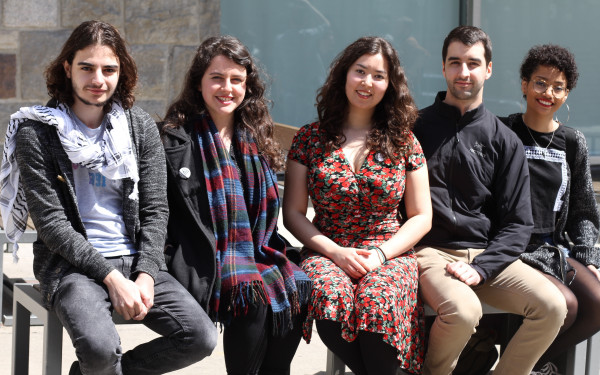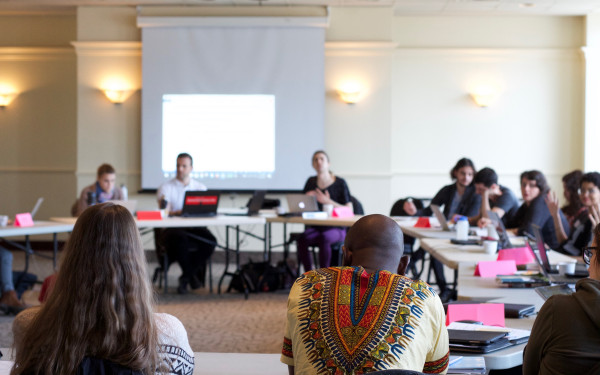AVEQ Paid Almost $1,000 to Former Staff to Drop CNESST Complaints
As Board Struggled With Revenue, Late Pay and Complaints of Harassment Were Common
The defunct Association for the Voice of Education in Quebec paid close to $1,000 to prevent a former staff from taking legal action against the organization, The Link has learned.
Former Advisor to the Executive Sophia Sahrane said they agreed to drop harassment complaints against AVEQ and to not take legal action against any former staff in exchange for extra vacation pay.
At its peak, AVEQ represented about 45,000 students across Quebec. After existing for less than four years, it dissolved last month amid decreasing revenue and low membership.
Related
Association for the Voice of Education in Quebec Announces Closure
Sahrane first filed complaints against the organization in October for late pay, psychological harassment, retaliation and masked firing through the Commission des normes, de l’équité, de la santé et de la sécurité du travail, responsible for enforcing Quebec’s labour code.
Sahrane agreed to make the deal after AVEQ’s board contacted them on Dec. 30. Sent on a Sunday, the letter sent around noon demanded a response to the board by 3 p.m. the same day.
Board members of AVEQ include Concordia Student Union executive Camille Thompson and Laura Daigneault, an executive for the student union at Université du Québec à Rimouski.
Thompson declined to comment on the alleged harassment and other complaints for legal reasons, and both declined to comment on the settlement.
“I couldn’t afford to stand my ground and defend myself,” Sahrane said. “And they wanted to make sure that they were protected and that they weren’t going to get sued—because they knew they did something illegal.”
“I couldn’t afford to stand my ground and defend myself, and they wanted to make sure that they were protected and that they weren’t going to get sued—because they knew they did something illegal” – Sophia Sahrane
Two other former employees, who didn’t want to be named, also claimed they were harassed by Sahrane.
“There might be legitimate arguments in Sophia’s case with the CNESST,” said former AVEQ executive Aouatif Zebiri. “I would say we didn’t [harass them], and I would question the timing of filing their complaint.”
Zebiri said she found it concerning that Sahrane only filed complaints after executives and other staff started bringing their concerns about how AVEQ’s finances were being handled to their board.
The previous Finance Coordinator Mathieu Vaillancourt, Zebiri and the two former staff also claimed Sahrane mishandled AVEQ’s bank account. Vaillancourt said Sahrane took a monopoly on managing their funds by locking him out of their bank account until late October.
“I had to bring it to the board, to force them to give me access,” Vaillancourt said. “My job was to take care of the finances, but [they] wouldn’t give me access. It was completely crazy.”
The four claimed that Sahrane failed to be transparent with the executive team about their decreasing cash flow, paying the association’s rent, salaries and hydro through a line of credit without the executive team’s knowledge throughout late August and October. The four also agreed that AVEQ’s board failed to appropriately deal with the situation and their concerns about finances and Sahrane’s absence from the office.
Sahrane’s job included taking care of administrative costs. Sahrane said it’s not possible they mishandled money since all expenses they made were approved by the board, executives or through students representing AVEQ’s member-associations. They also said the use of a line of credit was never a secret, and that open discussions concerning that began at a congress in July of 2018 as a way to deal with membership dues that often came in late.
Sahrane said they decided not to give Vaillancourt access to AVEQ’s bank account because the executive team had exercised poor judgement with how money should be spent. That included calls for cleaning services for their office and, in one instance, a $200 request for sodas for a barbecue by Concordia’s Graduate Student Association.
Related
Former Employee Alleges AVEQ Executives Misused Association Credit Cards
“I said, ‘If you want to do this, you’ll need approval from the board, because it’s not in our mandate,’” Sahrane said. In a number of instances they said executives ignored that advice by purchasing things without the board’s approval.
When it came to accessing the bank account, Sahrane said they decided to not provide Vaillancourt with the login information for the account since they didn’t want to be held legally liable in case he misspent money.
“I didn’t want them to be in a situation where they could just use AVEQ’s money for whatever, because they had exhibited carelessness,” Sahrane continued.
According to a document provided to The Link, Vaillancourt’s job description didn’t mandate he have access to their bank account, though the board later granted him access in late October.
“I don’t know exactly what was shared and what wasn’t shared,” said Thompson, who declined to comment on whether Sahrane mishandled money. “[But] I know there was a lot of mistrust happening.”
Late Pay Common Amid Decreasing Revenue
While interpersonal conflicts were common there were also recurrent problems in staff and contract researchers getting paid on time.
“Issues were brought to the board multiple times, and really the issue was that the board failed to deal with these issues in an appropriate time-frame, which really contributed to an overall negative environment in the workplace, and also difficulties financially speaking,” said Chloe Cavis-Haie, a former graphic designer with AVEQ. “I think that if the board had dealt with these issues earlier, we wouldn’t be in this problem that we are right now, and we wouldn’t be in the deficit that we are right now.”
Former Research Coordinator Mikayla Harris said she learned of one researcher not being paid between July and August after beginning her position in mid-September. Once they were paid at the end of September, their cheque bounced as AVEQ had maxed out its line of credit.
“I don’t think he got paid until end of October for July, August, September and ultimately October,” Harris said.
In the summer AVEQ projected a deficit of about $70,000. Cavis-Haie said member-associations later learned a deficit well surpassing what was originally projected had incurred while at a congress in mid-October.
And while others complained of Sahrane’s absence, Sahrane highlighted that they didn’t receive any pay between Sept. 8 and Nov. 6. Sahrane also said their pay due in the end of December was only received a week a half later. Cavis-Haie told The Link they’re unsure if AVEQ owes them any more pay since they’ve been unable to access their pay-stubs.
Both Sahrane and Vaillancourt were responsible for collecting fees from member-associations, but fees from Concordia students only came in late October as miscommunication over signing officers led to the university cancelling payments. Fees due from Chicoutimi students were never received, while those from UQAR students only came through on Nov. 1.
The CSU later intervened, sending AVEQ a loan of close to $35,000 at the end of October. It was later paid back by mid-December.
Undergraduates at Concordia have paid $3.50 each semester to AVEQ since 2015. With fees for this semester already sent off, CSU Finance Coordinator John Hutton told The Link that some those fees could return to CSU once AVEQ’s remaining debts are paid.
CSU General Coordinator Sophie Hough-Martin said the union isn’t in any rush to join a new provincial association, and will “shop around” by opening up discussions with other Quebec associations to see what works best for them.
“[With The Association pour une solidarité syndicale étudiante looking like it’ll dissolve], students in Quebec are now only left with right-leaning provincial student associations who will take over in consultations with the provincial government,” said Vaillancourt. “It’s absolutely terrible for the student movement in Quebec.”

_900_600_90.jpg)


_600_375_90_s_c1.jpg)


